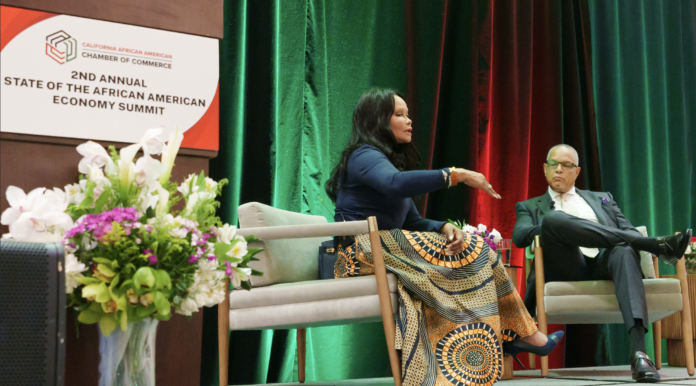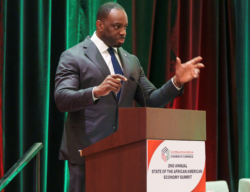
By Solomon O. Smith, California Black Media
The California African American Chamber of Commerce hosted its second annual “State of the California African American Economy Summit,” with the aim of bolstering Black economic influence through education and fellowship.
Held from Jan. 24 to Jan. 25 at the Westin Los Angeles Airport Hotel, the convention brought together some of the most influential Black business leaders, policy makers and economic thinkers in the state. The discussions focused on a wide range of economic topics pertinent to California’s African American business community, including policy, government contracts, and equity, and more.
Toks Omishakin, Secretary of the California State Transportation Agency (CALSTA) was a guest at the event. He told attendees about his department’s efforts to increase access for Black business owners.
“One thing I’m taking away from this for sure is we’re going to have to do a better job of connecting through your chambers of all these opportunities of billions of dollars that are coming down the pike. I’m honestly disappointed that people don’t know, so we’ll do better,” said Omishakin.
Lueathel Seawood, the president of the African American Chamber of Commerce of San Joaquin County, expressed frustration with obtaining federal contracts for small businesses, and completing the process. She observed that once a small business was certified as DBE, a Disadvantaged Business Enterprises, there was little help getting to the next step.
Omishakin admitted there is more work to be done to help them complete the process and include them in upcoming projects. However, the high-speed rail system expansion by the California High-Speed Rail Authority has set a goal of 30% participation from small businesses — only 10 percent is set aside for DBE.
In 1996, California was the first state to eliminate affirmative action programs through Proposition 209. Since then, African Americans have struggled to achieve equity in education, according to a study at UC Berkely, California, and continue to face inequity in business according to a study commissioned by the Equal Justice Society, which showed a loss in contracts of $1 billion for minority and women business enterprises (MWBEs).
Funds issued by the federal government require that the equity be measured in a disparity study. The data is used to evaluate DBEs and decide how to address any shortfalls. The 2022 Caltrans FTA Disparity Study placed African Americans at the bottom.
“Caltrans and subrecipient local agencies awarded 0.4 percent of their relevant contract dollars to POC- and woman-owned businesses,” the report reads.

The importance of Diversity, Equity and Inclusion (DEI) in economics was reinforced during the “State of the California Economy” talk led by author and economist Julianne Malveaux, and Anthony Asadullah Samad, Executive Director of the Mervyn Dymally African American Political and Economic Institute (MDAAPEI) at California State University, Dominguez Hills.
Malveaux emphasized the significance of economics as a form of political influence. She focused on the power and size of the California economy and the position of African Americans within this power structure. Assaults on DEI disproportionately affect women of color and Black women, according to Malveaux. When asked what role the loss of DEI might serve in economics, she suggested a more sinister purpose.
“The genesis of all this is anti-blackness. So, your question about how this fits into the economy is economic exclusion, that essentially has been promoted as public policy,” said Malveaux. Samad co-authored the “2022-2023 State of Black Los Angeles County Report” which examines factors affecting African American’s well-being, both sociologically and economically. In response to the George Floyd protests in 2020, the Los Angeles County Board of Supervisors commissioned the study after establishing the Anti-Racism, Diversity, and Inclusion Initiative. It includes data on physical and mental health, housing, education, safety, justice and community recommendations.
The report will be produced annually and presented to the Los Angeles County Board of Supervisors. The most anticipated speaker at the event was Janice Bryant Howroyd known affectionately to her peers as “JBH.” She is one of the first Black women to run and own a multi-billion-dollar company. Her company ActOne Group, is one of the largest, and most recognized, hiring, staffing and human resources firms in the world. She is the author of “Acting Up” and has a profile on Forbes.
Chairman of the board of directors of the California African American Chamber of Commerce, Timothy Alan Simon, a lawyer and the first Black Appointments Secretary in the Office of the Governor of California, moderated. They discussed the state of Black entrepreneurship in the country and Howroyd gave advice to other business owners.
Howroyd was dynamic and engaging, offering guidance and fielding inquires. She discussed her modest start with just $900, primarily borrowed from her mother. She also gave advice about how to get to the next level, advising the audience to see their business on a global scale, use new technologies and to be “thoughtful” of what they put on the internet. Howroyd’s style of sharing her personal
life with those looking for the keys to success has evolved into the “Ask JBH Podcast.”
“We look to inspire and educate,” said Howroyd. “Inspiration is great but when I’ve got people’s attention, I want to teach them something.”
The Chamber also arranged several workshops to connect businesses directly with the resources they need. An adjoining ballroom connected employees with companies. There were workshops for gaining contracts in industries like health care and energy, and a “matchmaking session” introducing business owners to companies with similar goals.
For chairman Simon the summit is over, but the work has just started.
“The opposition to DEI is well funded. They’re working at all levels of government and in corporations,” said Simon. “But there are still ways that we can continue to elevate our economic profile in anti-DEI environment and that’s what this chamber is committed to doing.”


